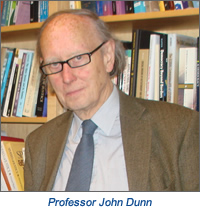
John Dunn, Emeritus Professor of Political Theory at King’s College, Cambridge, delivered this year’s Henry L. Stimson Lecture on World Affairs, a series of four talks entitled, “Beyond the Democratic Maze,” during two weeks in April. He set out to clarify the meaning of the term democracy, “the master idea by which we seek to take our bearings.”
Starting out, Dunn said he wanted “to de-parochialize the understanding of democracy for today and tomorrow – to disentangle it as far as I can from the contingencies of local political experience and relocate it back in the intractably global setting it now so unmistakenly occupies.” He did that by focusing principally on democracy, or democratic tendencies and yearnings, in China and India.
In the lectures, Dunn sought to answer several questions: “Why does this word now hold such singular political authority? What exactly is it that modern populations are consenting to subject themselves to in accepting democracy’s sway?”
In answer to the last question, he said democracy is an agreement to subject oneself “to the power and will of others without sacrificing personal dignity or voluntarily jeopardizing individual or family interests.”
Dunn’s lectures covered a broad range historically, from ancient Greece to 17th century England, to 19th century Toqueville’s take on the United States, to global modern times, including today’s struggles in the Middle East.
He said that in America “democracy” is often thought of as a synonym for “good government.” He added, “No one inspecting the United States today could sanely conclude that it is governed by its people; but a handsome majority of those who do in some sense govern it today…have obtained or retained their opportunity to do so, whether directly or by delegation, by courtesy of the people.”
He noted that the reality often differs from the dreams of America’s founders. “In America’s domestic politics, that great tide of energy and hope has been pretty effectively blocked for most of those two hundred years…and likely to remain so for the near future.”
Still, the spread of the concept of democracy, he argued, “is to an overwhelming degree one thing – the role which it came to play in explaining America’s politics to itself.” But in America’s dealings in the world, he said, “It is harder for Americans than it has always been on the receiving end to see clearly the coercive character of their own power in use.”
Dunn said that as democracy spread around the world, it became necessary to recognize “what forms of equality it is heard to threaten or promise, and what types of economic structures are seen to be compatible with it or precluded by it.” That led into his discussion of China, where he said Chinese officials encountering representatives of the West “sought to grasp where the power which was relentlessly molesting them had come from and what it rested on, in order to draw on its sources directly for themselves.” He said Chinese society emphasizes the need for order and hierarchical authority, and its long and undemocratic history make political change harder and slower, although he credits them with recent leaps in economic democracy.
In contrast, Dunn called India a true democracy and says its survival against difficult odds reveals “the extraordinary absorptive capacity of democracy as a political category,” which he tied both to the legacy of British rule and the struggle to escape it, as well as to the visionary and courageous leadership of India’s indigenous leaders. He nevertheless points out that major problems persist, from terrible poverty to government corruption and police brutality.
In his concluding lecture, Dunn says in reference to his title, the Democratic Maze, “If we look back carefully along the route which has led us here, it [democracy] can still help us to judge better if we apply it to the structure and authorization of particular regimes” but not to individual decisions.
